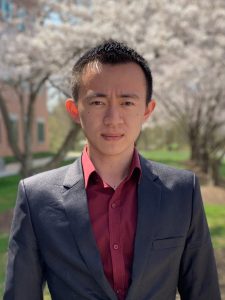
Armando Sanchez
University of St. Thomas
Houston (29.7° N, 95.3° W)
featuring Andrew Yuwen, Leadership Development Program, Investment Management, Phoenix (33.4° N, 112.0° W)
What motivates you? What goals do you strive to accomplish? Would your ideal future self look back at what you are doing right  now and see you making progress toward him? These are some questions that I contemplated after interviewing Andy Yuwen, who graduated from Rice University in 2018 with a BA in chemical and biomolecular engineering, mathematical economic analysis, and managerial studies. Andy is now in a leadership development program at a large investment management firm that allows him to work in different parts of his company, rotating positions every six months. He has answered questions from 401(k) participants, worked as a project manager in a cost basis department, and worked in a leadership position on the trade floor. Currently, he is an investment analyst supporting relationship managers and salespeople.
now and see you making progress toward him? These are some questions that I contemplated after interviewing Andy Yuwen, who graduated from Rice University in 2018 with a BA in chemical and biomolecular engineering, mathematical economic analysis, and managerial studies. Andy is now in a leadership development program at a large investment management firm that allows him to work in different parts of his company, rotating positions every six months. He has answered questions from 401(k) participants, worked as a project manager in a cost basis department, and worked in a leadership position on the trade floor. Currently, he is an investment analyst supporting relationship managers and salespeople.
Since Andy is based in Arizona, we agreed to have the conversation through Google Hangouts. Andy is relatively fresh out of college, but he already has a wide skill set and many opportunities in his future. Therefore, I was especially curious about the energy and motivation that has driven him to his current position in life.
Andy pursued various interests at Rice. One of the classes that had the biggest impact on him was Probability and Statistics. He explained how the general public lacks a basic understanding of statistics. He pointed out that the knowledge he gained from this class, which he took as a freshman, could be applied to virtually any job in any field. Being able to filter out noise and randomness from data sets is crucial when working with investments in his current position.
What makes Andy unique is his perspective on the relationship between his life and his career. The child of Chinese immigrants, Andy has always been passionate in all his activities. He was able to excel simultaneously in both academic and extracurricular pursuits. Growing up, he learned to play violin and also played tennis competitively. One can only make significant progress when their work becomes a lifestyle. An athlete must not only put in hours on the court to be good, he must also allow the sport to seep into every aspect of his life; from diet, to research, to sleep schedule, every aspect is affected. It is the same for a musician; taking lessons is one thing but to progress as an artist, one must dedicate their lifestyle to the craft. It is clear Andy has these characteristics. Even while pursuing multiple majors and working part-time, Andy found the time to lead Rice Club Tennis. He also became a teaching assistant for the statistics class mentioned earlier. After graduation, this mindset has not faltered; he continues to maintain this energy at the dawn of his professional career.
I was getting a sense of his mindset throughout the interview process and Andy’s answer to my final question really solidified my impressions. He explained that he was not interested in the idea of success or failure; he was there for the experience. He told me, “I don’t think you should be driven by success. I don’t think that’s a healthy or sustainable mindset because you are going to have failures.” I came to the conclusion that life is not about working to achieve something in the future; rather, life is about achieving something through work in the present.
Highlights from the Interview
What led you to your current position?
During college, I had the opportunity to be a leader in many regards. I led Rice’s Club Tennis team, I led a community service organization, and I was on the executive board of our student admissions council, which is the student wing of the admissions office. Through those kinds of leadership experiences, I thought I might want to be a leader in industry. That’s what led me to join a leadership development program at a large investment manager.
I’m about 20 months into my program so far and I’ve had a lot of different shifts. My first role was on the phones, answering questions from 401(k) participants. My second role was as a project manager in a cost basis department. It was a very generalist role in a very technical department. And then my third rotation was on our trade floor as a people leader, leading some of our analysts who provide data for our front-office and back-office functions. Through those experiences, I decided I did not want to go into formal leadership. So, I’m currently in an investment analyst position where I’m answering investment questions for our relationship managers and sales executives who are interacting with institutional clients and their consultants. I launch from this program in August, and then we’ll see where that takes me.
Along the way, you figure out what you’re interested in. And for me, I’m interested in almost everything. So then you figure out what skills are most useful for you to develop early on in your career and then you navigate towards that. And I think you can benefit a lot from being open-minded about what exact goal that means. I didn’t necessarily script out every move that I’ve made so far. I’ve learned a lot from allowing some chance or randomness in my career.
What specific class or classes do you think prepared you the most for this position?
I didn’t take many classes at Rice that were specifically applicable to this position. We didn’t have a business major for undergraduates, and I only took about two classes in our business school. But I would say that the most generally applicable class I took my freshman year was Probability and Statistics. I was taking it with a new professor at the time, Philip Ernst, and did really well in the class, so I ended up TAing for him my sophomore, junior, and senior years. In finance, and actually in almost every field, you have to have a good understanding of probability and statistics. I think that’s absolutely crucial, and it’s something that not a lot of people have. It’s definitely a gap in the market because there’s a lot in the world that is random and being able to cut through all the randomness and the noise to get to the bottom line, or understand what’s really going on behind all of the noise, is crucial.
So, for instance, I get a lot of questions from institutional clients and consultants that are asking about why certain funds are underperforming. If you do a statistical analysis, then you’ll realize that pretty much every fund is going to underperform for extended periods of time and that’s just noise, that’s just randomness. So, it does teach you to take a longer-term view and be a little bit more strategic about the way that you invest and the way that you think about problems. Because the short term doesn’t always matter much. You need to think about problems far away and think about investing, for instance, from a 30-year, 40-year type of timeframe.
Do you like your current position?
I’m in a rotational program. I rotate every six months. And my program is coming to an end, so at the end of this six-month rotation, I’ll be in a more long-term role. I do really like my current position; I am learning a lot from my peers as well as from more senior strategists and analysts. And I’m learning a lot about investments and products and the way that mutual funds and ETFs [exchange-traded funds] are managed. I also think that, in general, in your early career, you benefit a lot from moving around and getting different experiences. So, in four months when I’m done with this rotation, it’s likely that I’m not going to be in this role anymore, and that’s kind of bittersweet. I’ll miss my teammates and some of the experiences and the things that I get to do in this rotation. But I’ll hopefully move onto a role that’s going to teach me new things and provide me with a different perspective.
Looking at your LinkedIn, you have definitely accomplished a lot; you’ve done a lot of things. How were you able to stay motivated in all that?
There are a couple of answers to that question. It depends on what drives you fundamentally and how you view your life and your career. I do think that a lot of people view their life and career as being separate, and their life is something where they have friends and family, and their career is a way of financing that life. I personally take a different view. I think there’s two parts of my career. There’s my interest in both developing myself intellectually and developing myself as a person, which also makes me better in my personal life. And then there’s also the impact side. I have a very strong service mindset, and I want to dedicate my career to service. Different people take different approaches to this; some people go into public service and become public defense attorneys or policymakers or policy analysts. For me, I think the way that I’m best able to contribute to the community is to further the conversation on investments. Understanding wealth generation, understanding how people should invest, and bringing those products to those investors is what currently makes me passionate.
But going back to previous parts of my career, I don’t think you should be driven by success. I don’t think that’s a healthy or sustainable mindset because you are going to have failures, and you can look at my LinkedIn and see all of the successes that I’ve had, but there’s obviously been a lot of failures along the way. And if you’re only motivated by success, those failures would be absolutely devastating. But for me, I try to keep a long-term and developmental view in which I’m constantly comparing myself to the person that I’m going to be in 10, 20, 30, 40 years. And focusing on how I can make myself a better community servant. And so, when I fail, that’s an opportunity for me to learn. It’s oftentimes a misalignment; if I don’t get a job, it’s because I wasn’t ready for that job, or I was not aligned to that job. And that’s completely fine. And that allows me to immediately start thinking about what the next opportunity is or what the next thing that I could do might be.
Interview excerpts have been lightly edited for clarity and readability and approved by the interviewee.
